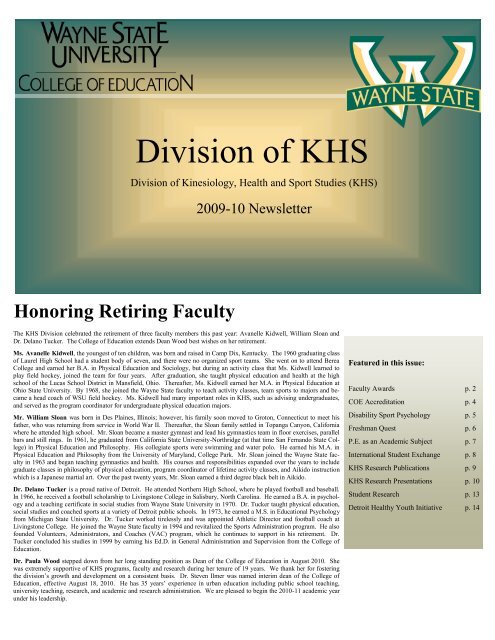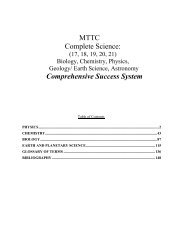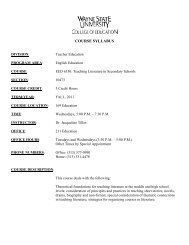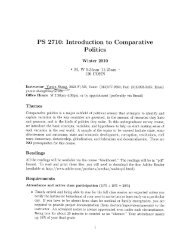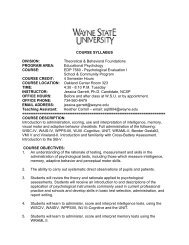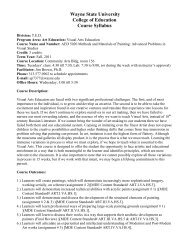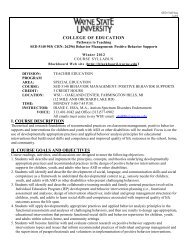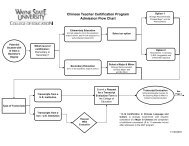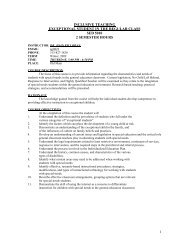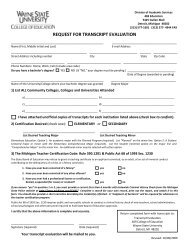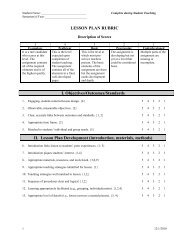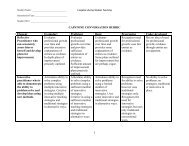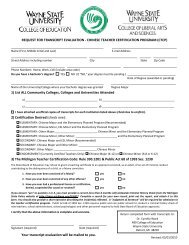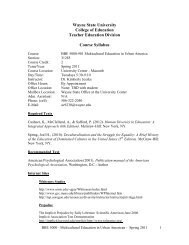Division of KHS - College of Education - Wayne State University
Division of KHS - College of Education - Wayne State University
Division of KHS - College of Education - Wayne State University
Create successful ePaper yourself
Turn your PDF publications into a flip-book with our unique Google optimized e-Paper software.
Honoring Retiring Faculty<br />
<strong>Division</strong> <strong>of</strong> <strong>KHS</strong><br />
<strong>Division</strong> <strong>of</strong> Kinesiology, Health and Sport Studies (<strong>KHS</strong>)<br />
2009-10 Newsletter<br />
The <strong>KHS</strong> <strong>Division</strong> celebrated the retirement <strong>of</strong> three faculty members this past year: Avanelle Kidwell, William Sloan and<br />
Dr. Delano Tucker. The <strong>College</strong> <strong>of</strong> <strong>Education</strong> extends Dean Wood best wishes on her retirement.<br />
Ms. Avanelle Kidwell, the youngest <strong>of</strong> ten children, was born and raised in Camp Dix, Kentucky. The 1960 graduating class<br />
<strong>of</strong> Laurel High School had a student body <strong>of</strong> seven, and there were no organized sport teams. She went on to attend Berea<br />
<strong>College</strong> and earned her B.A. in Physical <strong>Education</strong> and Sociology, but during an activity class that Ms. Kidwell learned to<br />
play field hockey, joined the team for four years. After graduation, she taught physical education and health at the high<br />
school <strong>of</strong> the Lucas School District in Mansfield, Ohio. Thereafter, Ms. Kidwell earned her M.A. in Physical <strong>Education</strong> at<br />
Ohio <strong>State</strong> <strong>University</strong>. By 1968, she joined the <strong>Wayne</strong> <strong>State</strong> faculty to teach activity classes, team sports to majors and became<br />
a head coach <strong>of</strong> WSU field hockey. Ms. Kidwell had many important roles in <strong>KHS</strong>, such as advising undergraduates,<br />
and served as the program coordinator for undergraduate physical education majors.<br />
Mr. William Sloan was born in Des Plaines, Illinois; however, his family soon moved to Groton, Connecticut to meet his<br />
father, who was returning from service in World War II. Thereafter, the Sloan family settled in Topanga Canyon, California<br />
where he attended high school. Mr. Sloan became a master gymnast and lead his gymnastics team in floor exercises, parallel<br />
bars and still rings. In 1961, he graduated from California <strong>State</strong> <strong>University</strong>-Northridge (at that time San Fernando <strong>State</strong> <strong>College</strong>)<br />
in Physical <strong>Education</strong> and Philosophy. His collegiate sports were swimming and water polo. He earned his M.A. in<br />
Physical <strong>Education</strong> and Philosophy from the <strong>University</strong> <strong>of</strong> Maryland, <strong>College</strong> Park. Mr. Sloan joined the <strong>Wayne</strong> <strong>State</strong> faculty<br />
in 1963 and began teaching gymnastics and health. His courses and responsibilities expanded over the years to include<br />
graduate classes in philosophy <strong>of</strong> physical education, program coordinator <strong>of</strong> lifetime activity classes, and Aikido instruction<br />
which is a Japanese martial art. Over the past twenty years, Mr. Sloan earned a third degree black belt in Aikido.<br />
Dr. Delano Tucker is a proud native <strong>of</strong> Detroit. He attended Northern High School, where he played football and baseball.<br />
In 1966, he received a football scholarship to Livingstone <strong>College</strong> in Salisbury, North Carolina. He earned a B.A. in psychology<br />
and a teaching certificate in social studies from <strong>Wayne</strong> <strong>State</strong> <strong>University</strong> in 1970. Dr. Tucker taught physical education,<br />
social studies and coached sports at a variety <strong>of</strong> Detroit public schools. In 1973, he earned a M.S. in <strong>Education</strong>al Psychology<br />
from Michigan <strong>State</strong> <strong>University</strong>. Dr. Tucker worked tirelessly and was appointed Athletic Director and football coach at<br />
Livingstone <strong>College</strong>. He joined the <strong>Wayne</strong> <strong>State</strong> faculty in 1994 and revitalized the Sports Administration program. He also<br />
founded Volunteers, Administrators, and Coaches (VAC) program, which he continues to support in his retirement. Dr.<br />
Tucker concluded his studies in 1999 by earning his Ed.D. in General Administration and Supervision from the <strong>College</strong> <strong>of</strong><br />
<strong>Education</strong>.<br />
Dr. Paula Wood stepped down from her long standing position as Dean <strong>of</strong> the <strong>College</strong> <strong>of</strong> <strong>Education</strong> in August 2010. She<br />
was extremely supportive <strong>of</strong> <strong>KHS</strong> programs, faculty and research during her tenure <strong>of</strong> 19 years. We thank her for fostering<br />
the division’s growth and development on a consistent basis. Dr. Steven Ilmer was named interim dean <strong>of</strong> the <strong>College</strong> <strong>of</strong><br />
<strong>Education</strong>, effective August 18, 2010. He has 35 years’ experience in urban education including public school teaching,<br />
university teaching, research, and academic and research administration. We are pleased to begin the 2010-11 academic year<br />
under his leadership.<br />
Featured in this issue:<br />
Faculty Awards p. 2<br />
COE Accreditation p. 4<br />
Disability Sport Psychology p. 5<br />
Freshman Quest p. 6<br />
P.E. as an Academic Subject p. 7<br />
International Student Exchange p. 8<br />
<strong>KHS</strong> Research Publications p. 9<br />
<strong>KHS</strong> Research Presentations p. 10<br />
Student Research p. 13<br />
Detroit Healthy Youth Initiative p. 14
Faculty Awards<br />
By Dr. Nate McCaughtry<br />
Left to right:<br />
Dr. Sally Erbaugh,<br />
Dr. Nate McCaughtry,<br />
Ms. Joyce Krause<br />
Dr. Nate McCaughtry received the Young Pr<strong>of</strong>essional Award from the Social Justice and Diversity Committee <strong>of</strong><br />
the American Alliance <strong>of</strong> Health, Physical <strong>Education</strong>, Recreation and Dance. This award recognizes superior promise<br />
in the areas <strong>of</strong> service, teaching, scholarship, and commitment to the goals <strong>of</strong> the Alliance, with a strong focus on<br />
under-represented and underserved populations.<br />
In addition, Dr. McCaughtry received the 2010 Kathleen Reilly Koory Endowed Faculty Development Award from<br />
<strong>Wayne</strong> <strong>State</strong> <strong>University</strong>’s <strong>College</strong> <strong>of</strong> <strong>Education</strong>. This award was established in 2004 by Howard and Beverly Reilly<br />
in memory <strong>of</strong> their daughter Kathleen Stewart Reilly Koory, who was a <strong>College</strong> <strong>of</strong> <strong>Education</strong> alumnus and a teacher<br />
in the Utica School District for 27 years.<br />
Dr. Jeffrey Martin has been elected an Active Fellow in the American Academy <strong>of</strong> Kinesiology and Physical <strong>Education</strong>. He<br />
joins former faculty members Dr. Weimo Zhu and Dr. Bradley Cardinal in this major scholarly accomplishment. Fellows <strong>of</strong> the<br />
National Academy <strong>of</strong> Kinesiology are honored for their significant and sustained contributions in the field <strong>of</strong> kinesiology<br />
through scholarship and pr<strong>of</strong>essional service. Members <strong>of</strong> the academy are considered the "who's who" <strong>of</strong> individuals in the<br />
fields <strong>of</strong> kinesiology and physical education. To be elected as a member, individuals must be nominated and ratified by the<br />
entire academy, must be currently engaged in pr<strong>of</strong>essional and/or scientific work in the field, and have demonstrated competence<br />
in the pr<strong>of</strong>ession for a minimum <strong>of</strong> 10 years. Furthermore, Dr. Martin has verbally accepted the editorship <strong>of</strong> a<br />
new journal titled Sport, Exercise and Performance Psychology. This new journal will serve as the <strong>of</strong>ficial publication <strong>of</strong> the Exercise and<br />
Sport Psychology <strong>Division</strong> <strong>of</strong> the American Psychological Association. A former pr<strong>of</strong>essional athlete, Dr. Martin has published more than 85 research<br />
articles as well as book chapters. His concentrated research focuses on the psychosocial aspects <strong>of</strong> disability sport and physical activity.<br />
Dr. Bo Shen was been promoted to associate pr<strong>of</strong>essor. He continues teaching his classes while pursuing research initiatives in motivation to<br />
learn and physical activity. Dr. Shen is actively involved with the <strong>KHS</strong> Learning Community that prepares students for the state teacher certification<br />
exam, and coordination <strong>of</strong> student teaching placement.<br />
New Faculty Members<br />
By Dr. Sarah Erbaugh<br />
<strong>KHS</strong> welcomes Dr. Noel Kulik as an assistant pr<strong>of</strong>essor in Health <strong>Education</strong> in the <strong>College</strong> <strong>of</strong> <strong>Education</strong>. She joins us from the prestigious School<br />
<strong>of</strong> Public Health at <strong>University</strong> <strong>of</strong> North Carolina, Chapel Hill. Since 2008, she has been a pre-doctoral fellow at the National Institute <strong>of</strong> Health<br />
(NIH) under Dr. Deborah F. Tate. Her area <strong>of</strong> research is maternal and child obesity.<br />
Dr. Kulik began her research career as an undergraduate student in <strong>Education</strong> and Women’s studies at <strong>Wayne</strong> <strong>State</strong>. She worked with Drs. Sally<br />
Roberts and Pam Reid on the GoGirlGo project which promoted science and math careers for middle school girls. Additionally, she served as a<br />
research assistant in the <strong>College</strong> for Urban, Labor and Metropolitan Affairs (CULMA) and the Developmental Disabilities Institute (DDI) while she<br />
was a graduate assistant in sociology at WSU. Along the way, she acquired an interest in the academic area <strong>of</strong> health and physical activity through<br />
elective coursework with Dr. Jeff Martin, <strong>KHS</strong> pr<strong>of</strong>essor in sports psychology.<br />
Dr. Kulik is very excited to return to Detroit and <strong>Wayne</strong> <strong>State</strong>’s <strong>College</strong> <strong>of</strong> <strong>Education</strong>. We look forward to her arrival in January 2011.<br />
Dr. Anne Murphy is a new assistant pr<strong>of</strong>essor <strong>of</strong> Research in <strong>KHS</strong>. She has grant-writing responsibilities in both the division and the college. Dr.<br />
Murphy earned a Ph.D. in Nutrition and a masters degree from <strong>Wayne</strong> <strong>State</strong> <strong>University</strong>. She has been affiliated with WSU for several years with her<br />
work with Drs. Nate McCaughtry and Jeff Martin and the research team for Generations With Promise.<br />
Dr. Murphy brings a unique and outstanding set <strong>of</strong> skills to the WSU, including program evaluation, networking, and knowledge <strong>of</strong> funding priorities<br />
at local and national funding agencies. We know that she will be a valuable asset in the very competitive arena <strong>of</strong> external funding <strong>of</strong> research proposals,<br />
and we welcome her to the <strong>College</strong> <strong>of</strong> <strong>Education</strong>.<br />
Ms. Lauren Whalen is a new lecturer in Sports Administration, replacing the retiring Dr. Delano Tucker. Ms. Whalen was previously a graduate<br />
teaching assistant in <strong>KHS</strong> and assisted with various special projects for VAC and the division. Since completing the WSU master’s program, she has<br />
held several administrative positions with Think Detroit/PAL, a local non-pr<strong>of</strong>it organization serving Detroit-area youth. Prior to this, she was the<br />
Associate Director <strong>of</strong> Admissions and assistant women's basketball coach at Albion <strong>College</strong>.<br />
2
Learning Communities<br />
By Dr. Bo Shen and Ms. Carla Palffy<br />
The 2009-10 Learning Community (LC) was an overall success. Based on the Michigan Test Teacher Certification (MTTC) results in April<br />
2010, the passing rate <strong>of</strong> students that participated in the LC was 78% significantly higher than the statewide average <strong>of</strong> 66%. Throughout<br />
the year, there were three pr<strong>of</strong>essional development workshops addressing teaching-related topics such as class management, teaching educational<br />
gymnastics in school, and job searching techniques. In addition, the LC peer mentors (qualified upper-classmen) worked closely<br />
with <strong>KHS</strong> students in test preparation and subject knowledge learning. The feedback from the <strong>KHS</strong> students regarding the quality <strong>of</strong> the LC<br />
program, services, and mentorship was very positive. As the LC program evolves and gains engagement insights, program development and<br />
planning will include the feedback and suggestions from the faculty and students.<br />
A special thank you to the following LC support staff: Carla Palffy (faculty), Joyce Krause (faculty), Chanterius Brock (peer mentor), Debora<br />
Correa (peer mentor), Rodney Pius (peer mentor), Brandon Poliquan (peer mentor), Priyasha Patel (peer mentor), and Rob Wozniak<br />
(peer mentor). A special thanks to Dr. Sarah Erbaugh, assistant dean for <strong>KHS</strong>, for the great level <strong>of</strong> support she provides to the LC. The<br />
positive impact on our students would not be possible without the involvement <strong>of</strong> the <strong>KHS</strong> faculty and the peer mentors. They provide invaluable<br />
assistance to our students and contribute to the growing success <strong>of</strong> this program. The funding proposal for next year has been submitted<br />
and the LC looks forward to the continuation <strong>of</strong> this valuable service to <strong>KHS</strong> students.<br />
Perspectives <strong>of</strong><br />
LC Peer Mentors<br />
The LC peer mentors are upperclassmen with academic success and a strong desire to mentor other students within <strong>KHS</strong>. The LC grant funding<br />
allows these peer mentors to provide tutoring services, academic support and social interaction. Below are some viewpoints from peer mentors:<br />
By Debora Correa<br />
The Kinesiology Learning Community (LC) is a great way to make friendships and find peers with similar interests. The LC promotes many<br />
social events where the members can get together to socialize and have a good time. During these events, people get to know each other and<br />
new connections are formed. The LC also promotes many academic events for Level 1 classes. We have a peer mentor for each one <strong>of</strong> the<br />
Level 1 classes, and the mentors hold study sections for exams and help students with papers and questions that they may have during the semester.<br />
There are also learning groups that help students to prepare for the math competency exams and the MTTC test. As a peer mentor, I can<br />
say that the work that the Kinesiology LC has been doing is great and very helpful for the students. I feel that the students who engage in review<br />
sections are more confident for their exam. With more involvement, students become more comfortable to call or email us and ask questions.<br />
I can also see new connections forming at every event, not just the social events, but even in the academic ones. The LC is bringing the<br />
students together and helping them to succeed in their lives at <strong>Wayne</strong> <strong>State</strong>. As a peer mentor, I'm glad I'm part <strong>of</strong> this group, and feel great to<br />
be able to help the students to succeed.<br />
By Priyasha Patel<br />
Being a peer mentor for the Kinesiology Learning Community has provided me with the opportunity to interact with fellow Kinesiology students<br />
who have similar interests in education. In aiming to enhance other students’ experiences academically and socially, I was able to develop<br />
my own intrapersonal skills while using my kinesiology expertise to help students better understand the subject matter. It has been a very rewarding<br />
experience personally.<br />
By Brandon Poliquin<br />
Peer Mentors from left to right: Rodney Pius,<br />
Debora Correa , Andrea Shaw, Brandon Poliquin<br />
This is my first year working with the Kinesiology Learning Community and it has been a very positive experience. It took me a while to see<br />
how things worked and what was expected <strong>of</strong> us as peer mentors. With a semester under my belt, I feel extremely confident in my role as well<br />
as the direction <strong>of</strong> the Learning Community as a whole. The more we engage ourselves as peer mentors, the better it is to gain the recognition<br />
we deserve. A few years ago the Learning Community was active but there wasn't a lot <strong>of</strong> marketing or knowledge from a student’s point <strong>of</strong><br />
view. A lot has changed over the years and students today have all sorts <strong>of</strong> opportunities to be part <strong>of</strong> this great Learning Community. This<br />
current group <strong>of</strong> staff and peer mentors is dedicated and I think it will only continue to grow.<br />
3
<strong>College</strong> <strong>of</strong> <strong>Education</strong> Accreditation Update<br />
By Dr. Mariane Fahlman<br />
The <strong>College</strong> <strong>of</strong> <strong>Education</strong> is currently involved in a process to review all programs and practices with the goal <strong>of</strong> eventual accreditation by<br />
the Teacher <strong>Education</strong> Accreditation Council (TEAC). The purpose <strong>of</strong> TEAC is to support the preparation <strong>of</strong> competent, caring and qualified<br />
pr<strong>of</strong>essional educators. It is dedicated to helping educator preparation programs improve and be accountable for their quality. By<br />
participating in the TEAC process, all <strong>of</strong> the teacher preparation programs in the college, including Physical <strong>Education</strong> and Health, will be<br />
strengthened.<br />
Dr. Mariane Fahlman represents <strong>KHS</strong> on the college’s TEAC advisory board. This board meets monthly and has undertaken the arduous<br />
task <strong>of</strong> determining how to demonstrate that the college is consistent with its theme, and prepares “Effective Urban Educators: Innovative,<br />
Reflective and Committed to Diversity.” Thus far, the board has worked with students and faculty to produce narrative statements addressing<br />
these components <strong>of</strong> the college’s mission.<br />
Additional tasks <strong>of</strong> the board include analyzing surveys completed by pre-service teachers, coordinating discussions about the college<br />
mission, theme and goals at COE assembly meetings, and determining how to demonstrate that the college, is indeed, meeting its goals.<br />
Crucial to this demonstration is a college-wide assessment on a variety <strong>of</strong> common student experiences. <strong>KHS</strong> students will be participating<br />
in this assessment by submitting assignments through a web-based tool called LiveText. Dr. Bo Shen is coordinating LiveText for the<br />
Physical <strong>Education</strong> students, and Dr. Fahlman is doing the same for Health students. Assignments such as lesson plans, unit plans, case<br />
studies and other selected assignments are required to demonstrate the college’s goals. By using LiveText, students within the college are<br />
graded with a common rubric and the grades are immediately stored and compiled in one database. This enables the college to determine<br />
both areas <strong>of</strong> strength and areas that need improvement.<br />
Exercise and Sport Science Programs<br />
By Dr. John Wirth<br />
Student retention and recruitment were important goals identified over the past year by both the university and the <strong>College</strong> <strong>of</strong> <strong>Education</strong>.<br />
In the area <strong>of</strong> student retention, the faculty in Exercise and Sport Science (ESS) invested a great deal <strong>of</strong> time in strategic planning sessions<br />
to impact and improve student retention. Faculty, and especially the academic advisors, planned and attended numerous Learning<br />
Community functions in an effort to help our students remain enrolled and progress toward graduation. Student feedback indicated that<br />
this contact with faculty in an informal setting was very much appreciated. ESS faculty intend to expand these functions in the coming<br />
academic year.<br />
Relative to student recruitment, ESS has updated its content on the <strong>KHS</strong> website and program flyers for public dissemination. Currently,<br />
there are preliminary plans to investigate the creation <strong>of</strong> a new undergraduate pre-pr<strong>of</strong>essional track. The task <strong>of</strong> examining the possibility<br />
<strong>of</strong> this pre-pr<strong>of</strong>essional track will be completed by winter <strong>of</strong> 2011.<br />
ESS would like to thank all faculty and students for a very successful year.<br />
4
Disability Sport Psychology<br />
By Dr. Jeffrey Martin<br />
Dr. Jeffrey Martin had the recent good fortune to talk about his research on Disability Sport Psychology to educators in Sweden,<br />
Turkey, and to paralympic athletes at United <strong>State</strong>s Olympic Training Centers in Alabama and Colorado. Additionally, he has<br />
invitations to speak on Disability Sport Psychology at national and international conferences in Arizona, Turkey, and Italy. The<br />
aforementioned events, combined with eight forthcoming book chapters in mainstream sport psychology texts on disability sport<br />
psychology topics, have given Dr. Martin a strong sense <strong>of</strong> optimism regarding the legitimacy and visibility <strong>of</strong> this emerging field<br />
as a discipline and pr<strong>of</strong>ession. Just a few years ago, there were little to no specific references to disability sport psychology research<br />
in sport and exercise psychology textbooks. From this perspective, athletes with disabilities truly were an invisible minority.<br />
Similarly, there were very few pr<strong>of</strong>essionals in adapted physical activity that paid much attention to the psychology <strong>of</strong> disability<br />
sport. The tremendous growth <strong>of</strong> the Paralympic Games has played a large role in bringing attention to Disability Sport Psychology,<br />
as well as documentaries such as “Murderball”. Furthermore, a small number <strong>of</strong> dedicated researchers have clearly shown<br />
that youth disability sport participants, adult exercisers, and elite-level paralympic athletes benefit from physical activity and sport<br />
participation.<br />
Children with disabilities, who <strong>of</strong>ten have fewer friends than able bodied children, benefit from the<br />
social nature <strong>of</strong> sport. Sports help individuals with disabilities expand and demonstrate a variety <strong>of</strong><br />
skills. In particular, athletes with disabilities develop healthy self-concepts and defy stereotypes held<br />
by able-bodied individuals. All persons with disabilities acquire tremendous benefits from daily<br />
physical activity. With continued public and scholarly visibility, the future is bright for athletes with<br />
disabilities and the field <strong>of</strong> disability sport psychology.<br />
Technology in Exercise Physiology<br />
By Dr. Hermann-J. Engels<br />
Last year, Dr. Engels received a Technology Mini-Grant from the <strong>College</strong> <strong>of</strong> <strong>Education</strong> to learn how to<br />
create instructional videos and other targeted electronic learning experiences for the exercise physiology<br />
program area. After attending workshops <strong>of</strong>fered by Dr. Mary Waker, the director <strong>of</strong> the college’s <strong>Education</strong><br />
Technology Center, on the use <strong>of</strong> iMovie, iTunes, and iPhoto technologies, Dr. Engels and several <strong>of</strong><br />
his students armed themselves with digital video cameras and other movie-making equipment. Subsequently,<br />
the exercise physiology laboratory was converted into a temporary movie studio. Using specific<br />
story boards that the group had developed on selected exercise physiology topics, they created a number<br />
<strong>of</strong> brief educational videos that can now be used in online or regular classroom settings for teaching and<br />
learning purposes. In the future, Dr. Engels intends to expand this initiative to develop additional videos<br />
for use with several <strong>of</strong> his pr<strong>of</strong>essional courses.<br />
iMovie, iTunes, and iPhoto are registered trademarks <strong>of</strong> Apple Inc.<br />
5
Freshman Quest<br />
By Mr. Chris Nolan<br />
Freshmen Quest activities are designed for students to create a network<br />
<strong>of</strong> friends who share a unique, common experience to support each other<br />
throughout their college career. Each trip is lead by an upperclassman student.<br />
Chris Nolan, director <strong>of</strong> Campus Recreation, and Jovita Scrogin, assistant<br />
director, accompany the students on each trip. Additionally, one or two WSU<br />
“experts” join the groups as representatives from various departments such as<br />
the WSU Police Department, Counseling and Psychological Services, the<br />
Academic Success Center or the Department <strong>of</strong> Kinesiology.<br />
All camping, hiking and canoeing supplies are provided to the students. Each<br />
trip is designed to completely orient incoming freshmen to the college experience<br />
at WSU. The students utilize this experience to form relationships, meet<br />
faculty and staff from the university, get acquainted with university departments<br />
and services, and most importantly, have fun! Day time activities include water sports and hiking. Evenings culminate with<br />
in depth conversations around the campfire regarding study skills, team building, dealing with stress and a variety <strong>of</strong> other topics.<br />
The 2009 Freshmen Quest season has grown considerably since its inception in 2008; enrollment increased from 37 students in 2008<br />
to 81 students in 2009. Critical improvements included on-site workshops for resume writing, internships and co-op programs. The<br />
program’s collaborative partnerships drew in students from the Department <strong>of</strong> Communication’s master’s level course in leadership,<br />
and mathematics tutoring and study sessions were also added. These program changes and operational enhancements were given<br />
high approval ratings based on course and trip evaluations.<br />
The future is very promising for Freshman Quest. The 2010 cohort <strong>of</strong> students consists <strong>of</strong> 112 incoming freshmen, reflecting a 38%<br />
increase in participation from 2009. In addition, faculty and staff from Computing Information & Technology, Chemistry, and Biology<br />
departments have joined this initiative. Program options incorporate two sections <strong>of</strong> hiking in Pinckney Recreation Area for a<br />
day and half. In summary, the Freshman Quest program gains interests and recognition year after year. The administrative staff is<br />
eager to expand and provide the most effective program to the WSU students.<br />
Student Spotlight in Sports Administration<br />
By Mr. Torrey Henry<br />
Torrey Henry was born and raised in Detroit by his mother, a single parent, and attended Detroit Public Schools. He<br />
graduated from Western International High School as the Salutatorian with a 3.90 G.P.A., and was a talented Varsity<br />
athlete in basketball, cross country, volleyball, and track & field. During his high school days, Torrey set a career<br />
goal to major in Sports Management in college. He formulated a strategic plan to achieve this goal and applied his<br />
instinctual fortitude.<br />
After earning a Bachelor <strong>of</strong> Science in Physical <strong>Education</strong> and a minor in Business from Grand Valley <strong>State</strong> <strong>University</strong>,<br />
he completed his studies at <strong>Wayne</strong> <strong>State</strong> <strong>University</strong> in the <strong>College</strong> <strong>of</strong> <strong>Education</strong>’s <strong>KHS</strong> <strong>Division</strong> by obtaining a Masters <strong>of</strong> Arts in<br />
<strong>Education</strong> with an emphasis in Sports Administration.<br />
Currently, Torrey is the Operations Manager with the Volunteers, Administrators & Coaches Training Program (VAC) in the college. His<br />
involvement with the VAC program began when he was in the 8 th grade, and has he progressed through the staff ranks as a member, youth<br />
coach, and camp instructor. As the Operations Manager, his duties include organizing sport camps, self esteem basketball camp instructor,<br />
overseeing after-school programming, and coordinating VAC certification workshops.<br />
Torrey states that working with urban youth is a honor and privilege. His understanding <strong>of</strong> their challenges is deep-rooted due to his own<br />
life experiences and upbringing. He finds this opportunity to give back very rewarding. Torrey finds inspiration and guidance by these<br />
two quotes: “Service is the rent we pay, for the space that we occupy”, and “A day without a smile is not worthwhile.”<br />
6
Lifetime Fitness Activities<br />
By Ms. Judy Anderson<br />
The <strong>Division</strong> <strong>of</strong> Kinesiology, Health and Sport Studies <strong>of</strong>fers a diverse and interesting selection <strong>of</strong> Lifetime Fitness Activities (LFA)<br />
courses designed to empower individuals to take charge <strong>of</strong> their health, quality <strong>of</strong> life, and recreational activities. We <strong>of</strong>fer convenient<br />
class times and high quality instructors. Students have a variety <strong>of</strong> opportunities to learn valuable recreational and personal fitness<br />
skills such as swimming, fencing, racquet sports, oriental arts, team sports, rock climbing, and strength training. For students, it is an<br />
opportunity to begin a lifetime program <strong>of</strong> fitness and recreational activities that will serve them well now and in the future.<br />
In order to provide students with quality opportunities to learn skills and activities, many courses are <strong>of</strong>fered at "beginning" as well as<br />
"continuing" levels. In many cases, courses may be taken more than once for credit. We <strong>of</strong>fer the following courses both winter and<br />
fall semesters, with many <strong>of</strong> them also <strong>of</strong>fered during spring/summer sessions: Aerobics (Cardio-Kickboxing, Sculpt, Stretch & Tone,<br />
Step & Tone and Step), Basketball, Billiards, Fencing, Golf, Personal Defense, Pilates, Rock Climbing, Swimming, Tae Kwon Do,<br />
Tai Chi Chuan, Tennis, Volleyball, Weight Training & Fitness, Yoga, and Zumba.<br />
Our facility equipment is new and improved. The aging weight room equipment was replaced in the fall 2009.<br />
All users <strong>of</strong> the facility, students, faculty and alumni, now have access to state-<strong>of</strong>-the-art Cybex equipment.<br />
The feedback from users has been very positive about the new equipment. The new equipment is durable and<br />
can sustain high levels <strong>of</strong> usage <strong>of</strong> the weight room.<br />
Physical <strong>Education</strong> as an Academic Subject<br />
Source: National Association for Sport and Physical <strong>Education</strong>. (2010). PHYSICAL EDUCATION IS AN<br />
ACADEMIC SUBJECT. Reston, VA: Author.<br />
Should PE be included in Title IV <strong>of</strong> ESEA as part <strong>of</strong> a well-rounded education? The American Alliance for Health,<br />
Physical <strong>Education</strong>, Recreation and Dance supports the concept. Unfortunately, the ever-increasing obesity crisis in<br />
America necessitates the inclusion <strong>of</strong> effective, well-funded physical education and health programs to help educate<br />
today's youth about the physical, emotional, and mental problems associated with poor health and inactivity.<br />
The original No Child Left Behind legislation <strong>of</strong> 2001 identified the following subject areas as “core academic subjects”: English, reading<br />
or language arts, math, science, foreign languages, civics and government, economics, arts, history, and geography. The exclusion <strong>of</strong> PE<br />
sent a strong message to state and local school boards and educational policy makers that the federal government viewed PE as a marginal<br />
subject. The limited time spent by students in PE over the past decade has complicated efforts to address the childhood obesity epidemic<br />
and other serious health problems faced by young people.<br />
The Department <strong>of</strong> <strong>Education</strong>’s proposed language for ESEA reauthorization addresses core academic subjects in Title IV, which is entitled<br />
“Academic Excellence in Core Academic Subjects.” Part A authorizes grants to support literacy and language arts efforts, Part B<br />
authorizes grants to support the teaching <strong>of</strong> science, technology, engineering, and mathematics, and Part C authorizes grants to support<br />
“Effective Teaching and Learning for a Well-Rounded <strong>Education</strong>.” Grants in Part C are to be used to support efforts to address “additional<br />
academic subjects,” which are defined as “the arts, foreign languages, civics and government, history, geography, environmental education,<br />
economics, and financial literacy, and such other subjects as may be identified by the Secretary.” Once again, PE has not been identified<br />
as an important subject.<br />
At the same time, the Department <strong>of</strong> <strong>Education</strong> has proposed eliminating separate funding for the Carol M. White Physical <strong>Education</strong><br />
Program (PEP) which was $78 million this year. This is the only stream <strong>of</strong> federal funding uniquely devoted to improving the quality <strong>of</strong><br />
PE. That funding has been consolidated with other funding streams in Title V <strong>of</strong> the draft legislation for ESEA re-authorization to create a<br />
new Department <strong>of</strong> <strong>Education</strong> initiative entitled “Safe, Successful, and Healthy Students.” This section <strong>of</strong> ESEA addresses PE as an<br />
optional learning support area, rather than an essential component <strong>of</strong> a well-rounded education.<br />
In today’s economic climate, few education agencies will have surplus financial and staffing resources to address optional or elective<br />
subjects. Failure to include PE among the academic subjects that are part <strong>of</strong> a well-rounded education will completely undermine the<br />
White House Task Force on Childhood Obesity’s recommendation to increase “the quality and frequency <strong>of</strong> sequential, age- and developmentally<br />
appropriate physical education for all students, taught by certified physical education teachers.”<br />
7
International Student Exchange<br />
By Dr. Qin Lai<br />
The <strong>Division</strong> <strong>of</strong> Kinesiology, Health & Sport Studies continues the collaboration with Beijing Sport <strong>University</strong> Graduate School in doctoral<br />
student training. Drs. Hermann Engels and Qin Lai were honored as visiting pr<strong>of</strong>essors by Beijing Sport <strong>University</strong> Graduate School in<br />
recognition <strong>of</strong> their advising and achievements in exercise science.<br />
Zongtao Li, a new doctoral student from Beijing, has been working with Dr. Lai for his research and dissertation since September<br />
<strong>of</strong> 2009. Zongtao's research focus is on the effects <strong>of</strong> neuromuscular activities <strong>of</strong> the lower extremities in elderly<br />
Chinese females. His studies were accepted for presentation at the annual conferences <strong>of</strong> American <strong>College</strong> <strong>of</strong> Sport Medicine<br />
(ACSM) and North American Society for Psychology <strong>of</strong> Sport and Physical Activity (NASPSPA) in the summer <strong>of</strong><br />
2010. In addition, Dr. Qin Lai is a key collaborator for two <strong>of</strong> China’s social science grants to investigate youth fitness development<br />
from an ecological perspective and athletic development in Chinese higher education from comparative perspectives.<br />
We are please to have our faculty members involved with international initiatives. The working relationship with Beijing Sport <strong>University</strong><br />
is proving to be mutually productive and beneficial.<br />
Student Recognition<br />
By Ms. Joyce Krause<br />
Two <strong>KHS</strong> students have received national and regional awards: Tim Soldan, an undergraduate major in kinesiology, and Ronny Benedict,<br />
graduate assistant.<br />
Tim Soldan, Major <strong>of</strong> the Year<br />
Tim Soldan was chosen by <strong>KHS</strong> pedagogy faculty as the Major <strong>of</strong> the Year to represent <strong>Wayne</strong> <strong>State</strong> <strong>University</strong> at the<br />
National Convention <strong>of</strong> AAHPERD. Tim was one <strong>of</strong> several hundreds <strong>of</strong> students from colleges and universities across<br />
the country nominated as an exemplary student in the field <strong>of</strong> kinesiology. He has an outstanding GPA and has demonstrated<br />
good teaching methods in his work at the elementary and high school levels during his student teaching placement.<br />
Tim earned an Associate Degree in Liberal Arts at Macomb Community <strong>College</strong> and worked in the field <strong>of</strong> business for<br />
10 years before enrolling at WSU.<br />
Tim attended Sterling Heights public schools. He enjoys the experience <strong>of</strong> WSU campus life and the field <strong>of</strong> education. Tim has traveled<br />
extensively to places such as Egypt, Turkey, Greece, South Africa, and Europe. His broadened insight to cultural diversity gives<br />
him much to be grateful for. He feels the <strong>KHS</strong> pedagogy program does an exceptional job preparing students for teaching positions.<br />
Ronny Benedict<br />
Ronny Benedict received "Outstanding Poster Presentation Award" at the master’s level for his paper presented at the<br />
Midwest Chapter conference <strong>of</strong> American <strong>College</strong> <strong>of</strong> Sport Medicine (ACSM) in October 2009. His research was to determine<br />
whether anthropometric factors predicted and correlated with balance performance on dynamic and static balance<br />
tests.<br />
Ronny is a graduate assistant who teaches weight training, assists Dr. Qin Lai with motor behavior research, and assists<br />
Dr. Hermann-J. Engels in the exercise physiology laboratory. He successfully presented his study entitled “Effects <strong>of</strong><br />
Anthropometric Factors on Balance Acquisition Among Youths” at the annual conference <strong>of</strong> the North American Society for Psychology<br />
<strong>of</strong> Sport and Physical Activity (NASPSPA) in the summer <strong>of</strong> 2009. Currently, Ronny is working on his thesis under the direction <strong>of</strong><br />
Drs. Lai and Engels. His research focuses on the relationship between overweight/obesity and postural control among youth.<br />
8
<strong>KHS</strong> Research Publications<br />
Scholarly Book:<br />
Davis, T. D., & Dillon, S. R., (2010). Adapted Physical <strong>Education</strong> Desk Reference. Blacksburg, VA: PE Central.<br />
Selected Publications<br />
Choi, Y. S., Seo, M., Scott, D. K., & Martin, J. J. (2010). Validation <strong>of</strong> the organizational culture assessment instrument (OCAI): Application <strong>of</strong> Korean<br />
version. Journal <strong>of</strong> Sport Management, 24, 269-289.<br />
Choi, Y. S., Martin, J. J., Park, M., & Yoh, T. (2009). Motivational factors influencing sport spectator involvement at NCAA <strong>Division</strong> II basketball<br />
games. Journal for Study <strong>of</strong> Sport and Athletics in <strong>Education</strong>, 3(3), 265-281.<br />
Choi, Y. S., Martin, J. J., Park, M., & Yoh, T. (2009). Motivational factors influencing sport spectator involvement at NCAA <strong>Division</strong> II basketball<br />
games. Journal for Study <strong>of</strong> Sport and Athletics in <strong>Education</strong>, 3(3), 265-281.<br />
Cothran, D., McCaughtry, N., Faust, R., Hodges Kulinna, P., & Martin, J. (2009). E-mentoring in physical education: Promises and pitfalls. Research<br />
Quarterly for Exercise and Sport, 80, 552-562.<br />
Dillon, S., McCaughtry, N., & Hummel, S. (2010). School districts’ hiring practices for new physical educators. Physical Educator.<br />
Engels, H.-J., Yarandi, H., & Davis, J.E. (2009). Utility <strong>of</strong> an ingestible capsule for core temperature measurements during body warming. Journal <strong>of</strong><br />
Exercise Physiology 12(1), 1-9.<br />
Fahlman, MM., McCaughtry, N., Martin, J., Shen, B., Brewart, B., and Flory, S. (2010). Racial and Socioeconomic Disparities in Nutrition Behaviors:<br />
Targeted Interventions Needed. Journal <strong>of</strong> Nutrition <strong>Education</strong> and Behavior. 42 (1), 10-17.<br />
LaVetter, D. & Choi, Y. S. (2010). Liability in goal post-related injuries on university campuses. Journal <strong>of</strong> Sport Administration & Supervision, 2(1),<br />
52-62.<br />
Shen, B., Winger, R., Li, W., Sun, H., & Rukavina, P. (2010). An amotivation model in physical education. Journal <strong>of</strong> Teaching in Physical <strong>Education</strong>,<br />
29, 72-84.<br />
Shen, B., McCaughtry, N., Martin, J., Fahlman, M. (2009). Motivational pr<strong>of</strong>iles and their associations with achievement outcomes. Journal <strong>of</strong> Teaching<br />
in Physical <strong>Education</strong>, 28, 441-460.<br />
Shen, B., McCaughtry, N., Martin, J., & Fahlman, M. (2009). Effects <strong>of</strong> teacher autonomy support and students’ autonomous motivation on learning in<br />
physical education. Research Quarterly for Exercise and Sport, 80, 44-53.<br />
Abstracts<br />
Dau, N., Sherman, D., Bolander R., Bir C., & Engels, H.-J. (2009). Acute effects <strong>of</strong> dental appliances on upper and lower isokinetic muscle function. In<br />
A.J. Harrison, R. Anderson, & I. Kenny (eds) Scientific Proceedings <strong>of</strong> the 27 th International Conference on Biomechanics in Sports, 281-285.<br />
Martin, J. J. (2010). The psychosocial dynamics <strong>of</strong> disability sport and exercise. Invited Senior Lecture for the Sport and Exercise Psychology section<br />
<strong>of</strong> the North American Society <strong>of</strong> Sport and Physical Activity (NASPSPA). Tucson, AZ.<br />
Dillon, S. Research Digest: Variables impacting access to the general education curriculum. (2009). Adapted Physical Activity Quarterly, 26(4), 366-<br />
369.<br />
Dillon, S. Research Digest: Factors impacting preschoolers’ nonsedentary physical activity levels. (2009). Adapted Physical Activity Quarterly, 26(4),<br />
366-369.<br />
Dillon, S. Research Digest: Physical activity levels in preschools. (2009). Adapted Physical Activity Quarterly, 26(3), 292-296.<br />
9
<strong>KHS</strong> Research Presentations<br />
ACSM Annual Conference, Baltimore, MD, June 2010<br />
Benedict, Jr., R.J., Lai, Q., Li G., Yu, H., & Engels H.-J. Predictability <strong>of</strong><br />
anthropometric factors on two balance tests in children.<br />
Engels, H.-J. Davis, J.E., Yarandi, H.N., & Galloway T. Effects <strong>of</strong> selected<br />
body warming interventions on objective sleep characteristics in women with<br />
insomnia.<br />
Fahlman, MM and Hall, HL. Training to Improve Functional Performance<br />
Also Increases Mucosal IgA in Elderly Women.<br />
Hall, HL, and Fahlman, MM. Functional Fitness <strong>of</strong> Elderly Women in Long<br />
Term Care Facilities is Increased With Exercise.<br />
Shen, B., Lee, T., Gwen, A., Milberger, S., Groesbeck, M., & Jen, C. Habitual<br />
physical activity behavior in preschoolers. Paper presented.<br />
Sun, H., Shen, B., Pukavina, P., & Li, W. Is active game a possible way to<br />
promote physical activity in school? Paper presented .<br />
ACSM – Midwest Conference, St. Charles, IL, October 2009<br />
Benedict, Jr., R.J., Lai, Q., Li G., Yu, H., & Engels H.-J. Predictability <strong>of</strong><br />
anthropometric factors on two balance tests in children.<br />
AAHPERD National Convention, Indianapolis, IN, March 2010<br />
Choi, Y. S., Yoh, T., & Shen, B. Sport spectators' satisfaction, identification,<br />
and involvement in women's pr<strong>of</strong>essional sports. Paper presented<br />
Davis, T. D., Dillon, S. R., Folsom-Meek, S., Roth, K. L., & Stanton-Nichols,<br />
K. Impact <strong>of</strong> federal and state policy on pr<strong>of</strong>essional preparation in APE. Presentation<br />
accepted.<br />
Dillon, S. R., Davis, T. D., & Moran, T. E. PETE and students with disabilities:<br />
Are we meeting the challenge? Presentation accepted.<br />
Lee, T., & Shen, B. Influence <strong>of</strong> teachers’ relatedness support on high school<br />
girls’ engagement. Paper presented.<br />
Li, W., Shen, B., Rubavina, P., & Sun, H. Parents’ coping with child weightrelated<br />
teasing in physical education. Paper presented.<br />
Obrusnikova, I., & Dillon, S. R. Teacher perceptions <strong>of</strong> problem situations in<br />
inclusive physical education. Paper presented.<br />
Shen, B., Choi, Y., Li, W., Rubavina, P., & Sun, H. Influence <strong>of</strong> gender and<br />
grade on amotivation in physical education. Paper presented.<br />
Sun, H., Shen, B., Li, W., &, Rubavina, P. Students’ beliefs and values, inclass<br />
physical activity, and fitness test. Paper presented.<br />
Yoh, T., & Choi, Y. S. Motivations toward participating in physical activity<br />
among international college students. Paper presented.<br />
AERA Annual Meeting, Denver, CO, April 2010<br />
Shen, B., Lee, T., Li, X., & McCaughtry, N. Urban female adolescents’ participation<br />
and intention in physical education. Paper presented.<br />
NASSM, Tampa, FL, June 2010<br />
Choi, Y. S., & Yoh, T. Assessing senior consumers’ satisfaction at community<br />
recreation centers. Paper presented.<br />
NASPSPA, Tuscon, AZ, June 2010<br />
Li, Z.T., Lai, Q., Luo, D.M., & Zhang, Y.M. Static balance tests in relation to<br />
fall risk index and fall history in the female elderly. Presentation accepted.<br />
Li, Z.T., Lai, Q., Luo, D.W., & Zhang, Y.M. Neuromuscular activity <strong>of</strong> the<br />
lower extremities and fall in Chinese female elderly. Presentation accepted.<br />
Other Local and National Presentations<br />
Berkey, D. S., Dillon, S. R., Sullivan, A., Faust, R. E., VanVolkinburg, P., &<br />
T., Johnson, T. R. (2009). Michigan Merit Curriculum: Aligning local curriculum<br />
with the MDE standards. Presentation at the annual meeting <strong>of</strong> the Michigan<br />
Association for Health, Physical <strong>Education</strong>, Recreation and Dance,<br />
Traverse City, MI.<br />
Berkey, D. S., Dillon, S. R., Sullivan, A., Faust, R. E., VanVolkinburg, P., &<br />
T., Johnson, T. R. (2009. Michigan Department <strong>of</strong> <strong>Education</strong>: Physical education<br />
framework for elementary and middle school. Presentation at the annual<br />
meeting <strong>of</strong> the Michigan Association for Health, Physical <strong>Education</strong>, Recreation<br />
and Dance, Traverse City, MI.<br />
Choi, Y. S., Yoh, T., & Park, M. (2009). A comparison <strong>of</strong> sport spectator<br />
behavior between women’s pr<strong>of</strong>essional and college basketball games. Paper<br />
presented at the Annual Conference <strong>of</strong> the Sport Marketing Association<br />
(SMA), Cleveland, OH.<br />
Choi, Y. S., & Shen, B. (2009). Sport Spectator Involvement <strong>of</strong> Pr<strong>of</strong>essional<br />
Women’s Basketball. Paper presented at the annual meeting <strong>of</strong> the Research<br />
Consortium, American Alliance for Health, Physical <strong>Education</strong>, Recreation<br />
and Dance (AAHPERD), Tampa, Florida.<br />
Dillon, S. R., & Obrusnikova, I. (2010). Ecology <strong>of</strong> the inclusive physical<br />
education gymnasium. Research presentation at the annual conference <strong>of</strong> the<br />
National Consortium for Physical <strong>Education</strong> and Recreation for Individuals<br />
with Disabilities, Reston, VA.<br />
Dillon, S. R., Lemerise, M., Castillo, R., & Herstein, J. (2010). Physical <strong>Education</strong><br />
for Students with Disabilities. Invited presentation at the 2010 Eat<br />
Healthy + Play Hard = Smart Students Conference, Dearborn, MI.<br />
Dillon, S. R. (2009). Physical <strong>Education</strong> for Students with Disabilities: Updates<br />
and Implications for Special Educators. Invited presentation at the annual<br />
conference <strong>of</strong> the Michigan Association <strong>of</strong> Public School Academies, Detroit,<br />
MI.<br />
Dillon, S. R. (2009). New Grade Level Content Expectations and Michigan<br />
Merit Curriculum Guidelines for Physical <strong>Education</strong>: Implications for Physical<br />
Educators. Invited presentation at the annual conference <strong>of</strong> the Michigan Association<br />
<strong>of</strong> Public School Academies, Detroit, MI.<br />
Dillon, S. R. (2009). Games for ALL Learners. Invited presentation at the<br />
annual conference <strong>of</strong> the Michigan Association <strong>of</strong> Public School Academies,<br />
Detroit, MI.<br />
Dillon, S. R, & Sullivan, A. (2009). Michigan Merit Curriculum, Grade Level<br />
Content Expectations and Adapted Physical <strong>Education</strong>: Making the connection.<br />
Presentation at the annual meeting <strong>of</strong> the Michigan Association for<br />
Health, Physical <strong>Education</strong>, Recreation and Dance, Traverse City, MI.<br />
Davis, J.E., Engels, H.-J., & Yarandi, H.N. (2010). Sleep quality, and daytime<br />
sleepiness in estrogen deficient post-menopausal women. SLEEP 2010 (24 th<br />
APSS Annual Meeting), San Antonio, TX.<br />
Davis, J.E., Engels, H-J., & Yarandi, H. (2009). Core body temperature and<br />
the symptom <strong>of</strong> sleep disruption. Midwest Nursing Research Society Annual<br />
Conference, Minneapolis, MN.<br />
Engels, H.-J. (2009). 2009 AAHPERD Midwest District Scholar Lecture –<br />
Ginseng and Exercise: Past, Present, and Future. Michigan Association for<br />
Health, Physical <strong>Education</strong>, Recreation and Dance, Traverse City, MI.<br />
Sullivan, A., & Dillon, S. R., (2009). The APE consultation model: Following<br />
the lead <strong>of</strong> K-12 physical education programs. Paper presented at the 2009<br />
Physical <strong>Education</strong> Teacher <strong>Education</strong> Conference, Myrtle Beach, SC.<br />
International Presentations<br />
Park, M.., Yoh, T., & Choi, Y. S (2009). Exploring attitudes toward the Paralympics<br />
games and its corporate sponsors. Paper presented at the Annual Conference<br />
<strong>of</strong> the North Society <strong>of</strong> Sport Sociology (NASSS), Ottawa, Canada.<br />
10
Student Scholarships<br />
By Ms. Joyce Krause<br />
Scholarships to <strong>KHS</strong> students for 2010-11 totaled more than $16,500. The ceremony<br />
was held on May 20, 2010 in the Community Arts Auditorium and was a<br />
joyous event. Many donors were present to meet recipients as they received their<br />
scholarship certificates.<br />
<strong>KHS</strong> students who received scholarships this year were: Nicholas Buza (health<br />
minor), Matt Ferry (Ph.D, physical education pedagogy), Robert Foscarin (physical<br />
education pedagogy), Rosaura Gonzalez de Gutierez (health), Abdurazak Hersi<br />
(physical education pedagogy), Danielle Jacobs (MA, physical education pedagogy),<br />
Sade Kirby (sports administration), Tamara Leibowitz (MA, physical education<br />
pedagogy), David Mihelcich (exercise science), Amy Tischler (Ph.D, physical<br />
education pedagogy), Amanda Van’t Wout (physical education pedagogy), and<br />
Aereo Watson (health and physical education).<br />
The majority <strong>of</strong> these <strong>KHS</strong> students received their funds from the Beverly Bain<br />
Endowed Memorial Scholarship. Beverly and her sister Shirley Bain Stroh received<br />
their health education degrees from WSU in the 1950s and taught physical education<br />
in the Detroit Public Schools. The students who received money from this<br />
scholarship were: Nicholas Buza, Robert Foscarin, Abdurazak Hersi, Tamara Leibowitz,<br />
Amy Tischler, Amanda Van’t Wout, and Aereo Watson.<br />
Robert Foscarin received the Leila Walters Hagen Scholarship. Leila Walters Hagen<br />
received her bachelor’s and master’s degree from WSU in the 1940s and taught in<br />
the Detroit Public Schools.<br />
Amanda Van’t Wout received the Joyce Krause Detroit Public Schools Endowed<br />
Scholarship. Amanda is completing her student teaching assignments in a Detroit<br />
public school.<br />
The Jimenez Family Annual Scholarship was given to Abdurazak Hersi. The<br />
Jimenez family donates money each year for a <strong>KHS</strong> student who demonstrates<br />
financial need. Dr. Delano Tucker, recently retired <strong>KHS</strong> faculty member, donated a<br />
scholarship this year to Sade Kirby in Sports Administration in memory <strong>of</strong> his parents,<br />
Fred and Ollie Tucker.<br />
Matt Ferry earned one <strong>of</strong> the Hubert and Elsie Watson Endowed Memorial Scholarships,<br />
Rosaura Gonzalez de Gutierez won the Jean W. Rockwell Endowed Scholarship,<br />
and Danielle Jacobs won an Edna Crosson Endowed Scholarship.<br />
A <strong>KHS</strong> Scholarship fund and a Sports Administration Scholarship fund are already<br />
established in the division. At the present time funds are being raised for a DPS<br />
Endowed Scholarship that would be given each year to a Detroit high school graduate<br />
in one <strong>of</strong> the <strong>KHS</strong> fields. Interested parties are invited to participate in this<br />
worthwhile, tax-deductible cause. In these difficult economic times, students certainly<br />
appreciate the additional financial assistance.<br />
Donations to any <strong>KHS</strong> scholarship or fund are always welcome and needed. Anyone<br />
interested in donating can call Joyce Krause at (313) 577-6212 in <strong>KHS</strong> or<br />
Joanne Osmer at (313) 577-1664 in the <strong>College</strong> <strong>of</strong> <strong>Education</strong>.<br />
11<br />
Front row: Amy Tischler, PhD candidate,<br />
and Beverly and Howard Reilly,<br />
parents <strong>of</strong> Kathleen Reilly Koory, who<br />
created the Faculty Development Award.<br />
Second row: Matt Ferry, PhD candidate,<br />
Abdurazak A. Hersi, Aereo Towanna<br />
Watson (little peeking head), Amanda E.<br />
Van'twout, Robert A. Foscarin.<br />
Third row: Danielle Jacobs, MA student,<br />
Dr. Hermann-J. Engels, faculty, Dr.<br />
Sarah Erbaugh, <strong>KHS</strong> Assistant Dean,<br />
Tamara Rinehart-Leibowitz, MA student,<br />
Dr. Nate McCaughtry, faculty award<br />
winner.
20 th Annual Southeast Michigan<br />
Physical <strong>Education</strong> Workshop<br />
Back row:<br />
Patti Dawes (charter school), Stefan Pitc<strong>of</strong>f (charter<br />
school), Roger Jackson (MAHPERD executive<br />
director), Keith Verellan (Catholic school), Nancy<br />
Thoenes (retired Fraser), Bob Marijanovich (Walled<br />
Lake), Sue Kendall (Catholic school).<br />
Front row:<br />
Jennifer Rivera (Livonia), Suzanna Dillon (COE),<br />
Carolyn McGannon (WSU), Carol Poenisch<br />
(Detroit), Nancy Overman (WSU), Joyce Krause<br />
(COE), Sarah Erbaugh (COE), Cherie Welch<br />
(Rochester).<br />
By Ms. Joyce Krause<br />
The <strong>Division</strong> <strong>of</strong> Kinesiology, Health and Sports Studies held its 20 th Annual Southeast<br />
Michigan Physical <strong>Education</strong> Workshop on Saturday, March 6, 2010 at Detroit<br />
Country Day School in Beverly Hills, MI.<br />
This annual workshop is presented in conjunction with the Michigan Association <strong>of</strong><br />
Health, Physical <strong>Education</strong>, Recreation and Dance (MAHPERD), the school districts<br />
<strong>of</strong> Macomb, Oakland, and <strong>Wayne</strong> counties, and the Archdiocese <strong>of</strong> Detroit.<br />
The presenters from <strong>Wayne</strong> <strong>State</strong> <strong>University</strong> included: Dr. Suzanna Dillon, Dr.<br />
Mariane Fahlman, Master Yong Kil, Tamara Rinehart-Lee, and Amy Tischler. The<br />
array <strong>of</strong> other presenters represented the school districts <strong>of</strong> Detroit, Ferndale, Fraser,<br />
Livonia, Troy, Walled Lake, and Woodhaven as well as St. Fabian and Bishop Kelley<br />
Catholic Schools.<br />
Special thanks to the physical educators from Detroit Country Day Middle School.<br />
They gave workshop sessions on golf, lacrosse, and wall climbing while extending a<br />
warm hand <strong>of</strong> hospitality with the use <strong>of</strong> their fabulous facility.<br />
Dr. Sarah Erbaugh, <strong>KHS</strong> assistanst dean, has been on the planning committee <strong>of</strong> this<br />
endeavor since its inception in the 1980s. She has always heartily endorsed the<br />
value <strong>of</strong> providing pr<strong>of</strong>essional development and networking opportunities for<br />
teachers in the tri-county area. The entire planning committee meets throughout the<br />
year and provides the structure for the event. The members <strong>of</strong> the committee are:<br />
Patti Dawes (Detroit charter school), Suzanna Dillon (COE), Sarah Erbaugh (COE),<br />
Sue Kendall (Catholic schools), Joyce Krause (WSU-retired Detroit), Mike LeMerise<br />
(WSU-retired Utica), Bob Marijanovich (Walled Lake), Patrice McAuliffe<br />
(Detroit), Carolyn McGannon (WSU-retired Detroit), Nancy Overman (WSU-retired<br />
Birmingham), Stefan Pitc<strong>of</strong>f (Melvindale charter school), Carol Poenisch (Detroit),<br />
Mary Ann Reardon (Woodhaven), Jennifer Rivera (Livonia), Bo Shen (COE), Amy<br />
Tischler (COE) and Nancy Thoenes (WSU-Fraser).<br />
Everyone had a great day enjoying the following workshops: CPR certification, wall<br />
climbing, golf, lacrosse, weight training, yoga, basketball, fitness, warm ups, badminton,<br />
tae kwon do, dance for the high school and elementary, <strong>of</strong>ficiating, reaching<br />
out to non-athletes in the gym, management during the first week <strong>of</strong> school, GLCEs<br />
for adapted physical education and assessment. Clearly, there was a workshop for<br />
every interest. Teachers and COE kinesiology majors went away with healthier<br />
bodies and smiling faces.<br />
12
Student Research<br />
By Dr. Nate McCaughtry<br />
<strong>KHS</strong> doctoral candidate Sara Flory is collecting data for her dissertation entitled “Early Career Physical Educators’ Perspectives <strong>of</strong> Learning<br />
to Teach in Urban Schools.” For this research, Sara is working with three physical education (PE) teachers who currently teach PE in<br />
urban schools, did not grow up in urban areas, and who have between three and eight years <strong>of</strong> teaching experience. Through daily teacher<br />
observations and one-on-one interviews, Sara is answering five specific research questions. First, she is interested in learning how teachers’<br />
experiences before physical education teacher education (PETE) influence their early career experiences. Second, Sara wants to know how<br />
teachers’ experiences during their PETE programs influence their early career experiences. Third, she is interested in determining what<br />
challenges and dilemmas that early career PE teachers face when teaching in urban schools. Fourth, Sara wants to examine the impact that<br />
differences in cultural backgrounds between urban students and teachers have on teachers' early career experiences. Finally, Sara is interested<br />
in the role that emotion plays in urban physical education teachers' early career development.<br />
This dissertation topic is especially interesting to Sara because <strong>of</strong> her previous work with urban PE teachers as a graduate research assistant<br />
with her advisor, Dr. Nate McCaughtry, for the Detroit Healthy Youth Initiative and Generation With Promise. Ultimately, Sara hopes her<br />
dissertation findings will lead to improvements in how PETE programs prepare pre-service teachers to be effective in all teaching situations,<br />
but especially for those who ultimately find employment in urban schools.<br />
Sara recently accepted a position at the <strong>University</strong> <strong>of</strong> South Florida in Tampa as an assistant pr<strong>of</strong>essor in the <strong>College</strong> <strong>of</strong> <strong>Education</strong>'s School<br />
<strong>of</strong> Physical <strong>Education</strong> and Exercise Science. Her responsibilities include teaching courses in secondary physical education, and she will<br />
continue her research on culture and physical education in the surrounding county school districts.<br />
By Dr. Qin Lai<br />
Attila Kovacs, a former WSU graduate student, completed his Ph.D in the Motor Neuroscience program at Texas A&M <strong>University</strong>. He is a<br />
post-doctoral research associate at the Human Brain and Behavior Laboratory within the Center for Complex System and Brain Sciences at<br />
Florida Atlantic <strong>University</strong>, which is a world-renown research laboratory.<br />
During his work as Ph.D student, Attila’s research focus was oriented towards identifying the mechanisms by which unimanual and bimanual<br />
sequential and continuous movements are learned, represented, processed and stored, as well as to identify constraining and facilitating<br />
factors that influence the learning and control <strong>of</strong> these movements. This work resulted in numerous publications in high impact factor peer<br />
reviewed journals.<br />
Within the theoretical framework <strong>of</strong> Coordination Dynamics, Attila’s primary interest is oriented towards understanding how coordination<br />
among specialized regions <strong>of</strong> the brain underlies human ability to attend, perceive, learn, remember, decide and act. Coordination dynamics<br />
is an overarching conceptual framework that describes, explains and predicts how patterns <strong>of</strong> coordination form and change at multiple<br />
levels <strong>of</strong> brain and behavior. Presently, Attila is working on research projects aimed at showing how the same principles <strong>of</strong> coordination<br />
dynamics that govern the dynamics <strong>of</strong> brain activity and behavior within a single person, also apply to human brains and behavior working<br />
together in social settings. To this extent, he is conducting experiments employing interpersonal behavioral paradigms while simultaneously<br />
recording dual electroencephalography (EEG) activity.<br />
In Memory <strong>of</strong> Jane Fink<br />
For many years, Jane Fink chaired the undergraduate physical education group, coordinated<br />
the program area and taught the elementary physical education methods courses. Her additional<br />
roles included student teaching supervision and academic advising. She was very well<br />
liked by everyone, faculty and students alike. Jane passed on March 2, 2010 at the age <strong>of</strong> 91<br />
in Lexington, Kentucky.<br />
13
Generations With Promise<br />
By Dr. Nate McCaughtry<br />
The Generation With Promise (GWP) is in its third year <strong>of</strong> implementation.<br />
Evaluation results indicate that this program is achieving its goal to empower middle<br />
school students in underserved communities with racial and ethnic health disparities.<br />
Furthermore, this program is driving improvement policies, improving<br />
environmental and youth behavior change related to healthy eating, physical education<br />
or activity, and a tobacco-free lifestyle. Seventeen schools with a total <strong>of</strong><br />
4,637 middle-school students in five Cities <strong>of</strong> Promise each receive $25,000 per<br />
year from the Office <strong>of</strong> the Surgeon General. The Michigan Department <strong>of</strong> Community<br />
Health (MDCH) implemented changes to create a healthier school environment<br />
and involve youth in a leadership roles. The project director, Dr. Kimberlydawn<br />
Wisdom, Michigan’s Surgeon General, supported an evaluation team from<br />
<strong>Wayne</strong> <strong>State</strong> <strong>University</strong>, <strong>University</strong> <strong>of</strong> Michigan and the Henry Ford Health System.<br />
The leadership and administrative team included MDCH staff from the tobacco<br />
and nutrition/physical activity sections and from the Michigan Department<br />
<strong>of</strong> <strong>Education</strong> Coordinated School Health Program Unit. This project is a three-year<br />
grant (2007-2010) supported by the W.K. Kellogg Foundation.<br />
Detroit Healthy Youth Initiative<br />
By Dr. Nate McCaughtry<br />
The Detroit Healthy Youth Initiative (DHYI) is a 10-year partnership between <strong>Wayne</strong> <strong>State</strong> <strong>University</strong> (WSU) and the Detroit Public Schools<br />
(DPS). The mission is to increase the health <strong>of</strong> Detroit youth by improving the quality <strong>of</strong> school health and physical education programs according<br />
to <strong>State</strong> <strong>of</strong> Michigan standards and benchmarks. We have begun the third phase <strong>of</strong> the project, in which WSU works comprehensively<br />
in nearly every DPS high school to enhance physical education (PE), improve health and nutrition education, and form Physical Activity Clubs<br />
(PAC) at each school.<br />
As the third phase began in summer 2009, we visited each high school to recruit administrator, teacher and student support and involvement in<br />
the project. By October, we had commitments from 39 teachers from 23 DPS high schools, which represents approximately 82% <strong>of</strong> DPS high<br />
school teachers and 84% <strong>of</strong> the districts' high schools.<br />
We began the project in early November 2009 with a kick<strong>of</strong>f celebration as part <strong>of</strong> the district-wide pr<strong>of</strong>essional development day. Thereafter,<br />
we conducted two pr<strong>of</strong>essional development workshops for the teachers. As the PE teachers engaged in the implementation <strong>of</strong> these new curricula,<br />
we set about helping each school establish an after-school or lunchtime PAC. These clubs were meant to be a safe, fun and supportive environment<br />
for students to engage in culturally-relevant lifetime fitness activities outside <strong>of</strong> conventional PE programs. Each school worked with a<br />
DHYI liaison to form a PAC committee, solicit student input regarding club activities, secure space and permission from administrators, advertise<br />
and recruit students to participate, and begin conducting weekly or bi-weekly PAC sessions.<br />
In February 2010, our attention turned back to the PE teachers as they attended the first culturally-relevant lifetime fitness activity workshops on<br />
Yoga and Pilates. At these workshops, teachers learned to implement these activities and received packages <strong>of</strong> physical activity equipment and<br />
instructional materials. In mid-April, our work with the PE teachers shifted to the Exemplary Physical <strong>Education</strong> Curriculum (EPEC) Personal<br />
Conditioning curriculum. The teachers attended a day-long pr<strong>of</strong>essional development workshop regarding the curriculum and received a comprehensive<br />
equipment and resources package for implementing it. Lastly, we conducted a project celebration to share our successes and plan for<br />
the next year.<br />
The mission <strong>of</strong> the DHYI has two linked and interconnected goals: (1) increasing the health <strong>of</strong> Detroit youth, and (2) improving the quality <strong>of</strong><br />
school health and physical education. At present, we are able to report outcomes on several <strong>of</strong> these objectives. As to the degree to which students'<br />
health has increased, we are pleased to announce two important initial results. First, during the baseline physical activity data collection<br />
only 55% <strong>of</strong> students reported participating in 225 minutes <strong>of</strong> MVPA during the previous week. However, by data collection points two and<br />
three, that percentage had increased to 61% and 67 % respectively. This shows an upward trend in students' MVPA, which is likely attributed to<br />
the PE class interventions. Second, PACs have been formed at each school that have engaged 2,890 students, many <strong>of</strong> whom have never participated<br />
in a school-sponsored physical activity program. For the remainder <strong>of</strong> the youth health/learning related objectives (e.g., motor skillfulness,<br />
fitness knowledge, PE class MVPA, cardiorespiratory fitness, healthy citizenship behaviors, physical activity attitudes, and nutrition<br />
knowledge), we have collected pre-intervention data as applicable and will collect post-intervention data at the end <strong>of</strong> the school year.<br />
We are equally pleased to report that our goal related to improving the quality <strong>of</strong> school health and physical education is well underway and, by<br />
all accounts, succeeding. Five <strong>of</strong> the six project objectives related to improving health and physical education programs center on training teachers<br />
to successfully implement new curricula (e.g., culturally relevant lifetime fitness activities, EPEP Personal Conditioning, pedometer fitness<br />
lessons, web-based resources, Michigan Model for Health: Nutrition Module). At the end <strong>of</strong> the school year, according to the final measure <strong>of</strong><br />
program improvement, our evaluation has found that, to date, 134 PAC club meetings have taken place, which is 134 more than ever before!<br />
14<br />
Dr. Kimberlydawn Wisdom, Michigan’s Surgeon<br />
General is seated in the center <strong>of</strong> 1st row and<br />
surrounded by GWP students and staff.
Graduate Assistants<br />
By Dr. Bo Shen<br />
Tamara Rinehart-Lee has been working closely with Dr. Bo Shen since the<br />
fall <strong>of</strong> 2008 studying physical activity levels and motivation to exercise and<br />
participate in physical education in preschool and high school. She began<br />
working as a technician for the Healthy Kids Healthy Lives Study, fitting<br />
preschoolers with accelerometers, gross motor skill testing, and leading<br />
parent exercise classes. Then, she studied high school girls’ motivation<br />
in physical education and the importance <strong>of</strong> the PE teacher's relatedness<br />
to his or her students. Tamara has also been a part <strong>of</strong> one <strong>of</strong> <strong>Wayne</strong> <strong>State</strong>'s<br />
INPHAASE projects with Henry Ford Health Systems called Healthy<br />
Bodies. This is a feasibility study that is collecting clinical, nutrition, and<br />
physical activity data on preschoolers. Most recently, she facilitated a yoga<br />
and Pilates workshop for the Detroit Healthy Youth Initiative.<br />
Danielle Jacobs is a graduate student in the Master <strong>of</strong> Arts in Teaching<br />
Physical <strong>Education</strong> program with a minor in Health. She is currently working<br />
with Dr. Suzanna Dillon on adapted physical education research projects.<br />
Danielle is a 2007 graduate <strong>of</strong> Madonna <strong>University</strong> with a Bachelor<br />
<strong>of</strong> Science in Sport Management and a recent recipient <strong>of</strong> a Master <strong>of</strong> Arts<br />
in Sports Administration degree in the <strong>College</strong> <strong>of</strong> <strong>Education</strong>. Her pr<strong>of</strong>essional<br />
goals include teaching physical education and health at the secondary<br />
level and eventually moving into athletics administration as an athletics<br />
director for a high school.<br />
Amy Tischler earned her bachelor’s and master’s degrees from WSU and<br />
has spent the last eight years teaching physical education in the Livonia<br />
School District. She is currently a doctoral student in Curriculum and<br />
Instruction with a specialty in Kinesiology under the supervision <strong>of</strong> Dr.<br />
Nate McCaughtry. Her research interests involve understanding how<br />
disengaged/low-skilled boys experience physical education and other<br />
physical activity cultures. In addition to taking doctoral classes and conducting<br />
research, Amy is also involved in teaching undergraduate and<br />
graduate content courses such as adventure and fitness education, movement<br />
and dance education, and sport education.<br />
Sara Barnard Flory earned her B.S. in Movement Science and Athletic<br />
Training from the <strong>University</strong> <strong>of</strong> Michigan and her M.A.T. from <strong>Wayne</strong><br />
<strong>State</strong> <strong>University</strong>. While working on her master’s degree, Sara worked as a<br />
Graduate Research Assistant for the Detroit Healthy Youth Initiative, a<br />
federally-funded grant program that focused on improving health and<br />
physical education programs in Detroit Public Schools. Her master’s thesis<br />
was published in Research Quarterly for Exercise and Sport. Sara has<br />
experience teaching K-8 physical education and health and is currently<br />
pursuing a Ph.D. in Curriculum and Instruction with a specialty in Kinesiology<br />
under the supervision <strong>of</strong> Dr. Nate McCaughtry. Her research interests<br />
involve defining and developing culturally-relevant physical education<br />
programs from the perspectives <strong>of</strong> students, teachers, parents, and curriculum<br />
writers.<br />
15<br />
Ronny Benedict is a graduate assistant who teaches weight training and is<br />
assisting with motor behavior research. He successfully presented his<br />
study entitled “Effects <strong>of</strong> anthropometric factors on balance acquisition<br />
among youths” at the annual conference <strong>of</strong> the North American Society for<br />
Psychology <strong>of</strong> Sport and Physical Activity (NASPSPA) in the summer <strong>of</strong><br />
2009. At the present time, Ronny is working on his thesis under the direction<br />
<strong>of</strong> Drs. Qin Lai and Hermann Engels. It focuses on the relationship<br />
between overweight/obesity and postural control among youths.<br />
Phil Dittmer earned his B.A. in Exercise Science from Adrian <strong>College</strong>. He<br />
is currently working on his master's degree in Kinesiology with a major in<br />
Sports Psychology under the supervision <strong>of</strong> Dr. Jeff Martin. His research<br />
topic for his thesis is body dysmorphia in male college-aged students and<br />
the effect it could have on their physiology. Phil currently teaches First<br />
Aid/CPR, Basic Weight Training, and Psychophysiological Foundations <strong>of</strong><br />
Physical Activity at the undergraduate level. Phil also has a background as<br />
a personal trainer. His future plans are to continue with his education at<br />
<strong>Wayne</strong> <strong>State</strong> <strong>University</strong> by obtaining his doctorate in Exercise Physiology.<br />
Matt Ferry earned his bachelor’s degree in Physical <strong>Education</strong> Pedagogy<br />
from the <strong>University</strong> <strong>of</strong> Wisconsin at Oshkosh in 2003. After teaching<br />
elementary school physical education in Charlotte, N.C. for two years, he<br />
attended Arizona <strong>State</strong> <strong>University</strong>, earning a master’s degree in Kinesiology.<br />
He also completed one year <strong>of</strong> his doctoral studies in Curriculum and<br />
Instruction. Thereafter, Matt transferred to WSU in the fall <strong>of</strong> 2008 and is a<br />
doctoral student under the supervision <strong>of</strong> Dr. Nate McCaughtry. His research<br />
interests include investigating the social forces that influence content<br />
and curriculum selection in secondary school physical education, and<br />
examining the nature <strong>of</strong> teachers’ social and emotional work. This past<br />
year Matt was a research assistant and physical activity instructor on an<br />
interdepartmental project that provided Head Start’s youth in the Detroit<br />
area with physical activity and nutrition lessons.<br />
Matt Ferry<br />
Phil Dittmer<br />
Tamara Rinehart-Lee<br />
Ronny Benedict<br />
Danielle Jacobs<br />
Sara Barnard<br />
Amy Tischler
<strong>Division</strong> <strong>of</strong> <strong>KHS</strong><br />
Dr. Sarah Erbaugh, Assistant Dean<br />
<strong>Wayne</strong> <strong>State</strong> <strong>University</strong>’s <strong>College</strong> <strong>of</strong> <strong>Education</strong><br />
<strong>Division</strong> <strong>of</strong> Kinesiology, Health and Sport Studies<br />
261 Matthaei Building<br />
Detroit, MI 48202<br />
Phone (313) 577-5998<br />
Fax: (313) 577-5999<br />
Newsletter Editor: Linda Jiménez<br />
<strong>KHS</strong>’s Year in Review<br />
By Dr. Sarah Erbaugh<br />
The 2009-10 academic year in the <strong>Division</strong> <strong>of</strong> Kinesiology, Health and Sport Studies was<br />
dynamic. The <strong>KHS</strong> faculty members maintain their outstanding productivity, and continued<br />
to expand our visibility and presence locally, nationally and globally.<br />
Recently, two outstanding faculty members have joined <strong>KHS</strong> in Health <strong>Education</strong>:<br />
Dr. Noel Kulik and Dr. Anne Murphy. We look forward to their contributions in programs,<br />
research, grant service, and community outreach. Our projects, such as Generation With<br />
Promise and Learning Communities, continue to enhance our overall image and urban<br />
focus. The Generation With Promise project included schools across five major school<br />
districts in southern Michigan. Dr. Nate McCaughtry was awarded another Physical <strong>Education</strong><br />
Program (PEP) grant to launch the third phase <strong>of</strong> the Detroit Healthy Youth Initiative<br />
in Detroit high schools. This is phase three <strong>of</strong> a 10-year project which aims to enhance<br />
the health and physical activity involvement <strong>of</strong> Detroit youth and their teachers.<br />
International students from China continue to seek <strong>College</strong> <strong>of</strong> <strong>Education</strong> research positions<br />
to further their careers in Exercise and Sport Science. Sara Flory, our first Ph.D student in<br />
Kinesiology Pedagogy, was <strong>of</strong>fered and accepted a tenured position at the <strong>University</strong> <strong>of</strong><br />
South Florida.<br />
This past year, Dean Paula Wood stepped down from the deanship after 19 years with the<br />
<strong>College</strong> <strong>of</strong> <strong>Education</strong>. Her advocacy and support for our division is greatly appreciated and<br />
will always be remembered. We also wish to acknowledge the passing <strong>of</strong> Jane Fink, a former<br />
faculty member in the division. She was a pillar <strong>of</strong> the undergraduate physical education<br />
programs for many years.<br />
As always, it is very exciting to review and share our major accomplishments with colleagues,<br />
students and alumni. We thank and congratulate all the faculty members who<br />
have contributed to the strategic development <strong>of</strong> <strong>KHS</strong>.<br />
www.coe.wayne.edu/kinesiology<br />
16


